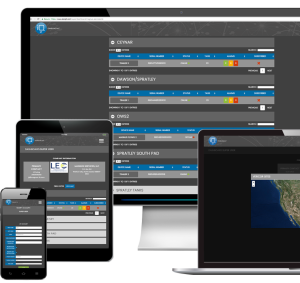Press Contact:
Uncategorized
What is a Private Cellular Network? Explained by LEC Technologies
In a world that’s becoming increasingly interconnected, businesses and industries need reliable and secure communication networks to stay competitive. A Private Cellular Network provides just that. It’s an exclusive, enterprise-controlled communication system that ensures better security, coverage, and capacity compared to public networks like Wi-Fi or traditional cellular systems.
But what exactly makes private cellular networks essential? Let's dive deeper into this transformative technology, examining its core concepts, advantages, use cases, and the future it holds.
Definition and Core Concepts
A Secured Private Cellular Network is a dedicated network that operates independently of public carriers. This network uses technologies such as Private LTE (Long-Term Evolution) or Private 5G to provide better control and performance. Unlike Wi-Fi, which operates on unlicensed spectrum and is more vulnerable to interference, private mobile networks use licensed or shared spectrum, providing enhanced coverage, speed, and security.
Key Components:
- Private LTE: Uses the same principles as LTE (4G) but on a private, enterprise-controlled network.
- Private 5G: The next-generation network, offering faster speeds and lower latency, is ideal for more demanding applications.
These networks can be custom-tailored to meet the unique needs of organizations, providing a level of security and control that public networks can't.
Key Advantages of Private Cellular Network vs Wi-Fi and Public Networks
- Security: One of the biggest concerns for businesses using public networks is security. Public networks share a spectrum with countless devices, making them susceptible to security breaches. Private cellular networks offer a secure, isolated environment, with encryption and dedicated access for authorized devices only.
- Coverage and Capacity: While Wi-Fi may struggle in larger environments or remote areas, Private Mobile Networks provide seamless connectivity across expansive campuses, manufacturing facilities, or even across geographically spread-out locations. With Private 5G, this coverage extends even further, supporting thousands of IoT devices at once.
- Reliability: In mission-critical sectors like healthcare, utilities, or transportation, network downtime is costly. Private networks are designed to provide consistent and high-quality connections, ensuring operations run smoothly even in the most demanding environments.
Use Cases Across Industries
Private Wireless Networks are being deployed across various industries, each with specific use cases. These networks enable organizations to meet their unique connectivity needs while improving efficiency and security.
1. Smart Cities
- Use Case: Enabling IoT devices for traffic management, public safety, smart lighting, and more.
- Benefits: A private network helps reduce congestion on public networks, offering faster communication and secure data transfer for real-time decision-making.
2. Manufacturing and Warehousing
- Use Case: Supporting automated systems, remote monitoring, and real-time equipment tracking.
- Benefits: By ensuring consistent network performance, manufacturers can optimize production, reduce downtime, and leverage predictive maintenance.
3. Education and Campuses
- Use Case: Providing seamless connectivity for smart classrooms, online learning, and campus-wide IoT devices.
- Benefits: Offers fast, reliable, and secure connections for students and staff, particularly in large or remote campuses.
4. Utilities and Energy
- Use Case: Managing smart grids, remote monitoring of infrastructure, and connecting mobile workforce devices.
- Benefits: Increases operational efficiency, reduces response times and improves service delivery.
Technological Infrastructure and Deployment
Deploying a Private Mobile Network involves careful planning and selecting the right technology stack. Many enterprises use Citizens Broadband Radio Service (CBRS), a shared spectrum that allows businesses to deploy their own private LTE or 5G network without needing to lease spectrum from a carrier.
Core Components:
- Base Stations: Serve as the anchor points for the network.
- Small Cells: Provide coverage in specific areas, improving network density and capacity.
- Customer Premises Equipment (CPE): Connects devices to the private network.
The deployment of Private 5G can bring additional benefits, such as low latency and higher data throughput, making it ideal for next-gen applications like autonomous vehicles, robotic automation, and real-time video surveillance.
Cost Considerations for Deploying a Private Cellular Network
When considering a Private Mobile Network, businesses must evaluate both upfront costs and long-term benefits. While initial investments are significant, the ROI from enhanced productivity, reduced downtime, and improved security can outweigh these expenses.
Key Cost Elements:
- Infrastructure Investment: Includes the purchase and installation of components like base stations, small cells, and customer premises equipment (CPE). Costs depend on the network scale and geographic coverage.
- Licensing and Spectrum: Enterprises may need to pay for spectrum access or licensing fees, especially when using Citizens Broadband Radio Service (CBRS) or private 5G.
- Operational Costs: Ongoing maintenance, network monitoring, and security management contribute to total ownership costs.
- Long-Term ROI: The substantial initial costs are often offset by the network’s ability to reduce downtime, enhance IoT support, and improve data security, resulting in significant operational savings and efficiency gains.
Challenges and Considerations for Scaling a Private Cellular Network
As businesses expand, scaling a Private Mobile Network becomes essential to support more devices, locations, and data traffic. However, scaling introduces several challenges that require careful planning.
Key Scaling Considerations:
- Network Capacity: As IoT devices grow, network performance must be optimized, potentially requiring additional base stations or advanced technologies like Private 5G.
- Interoperability: Different systems and devices across departments can complicate integration. Choosing adaptable, future-proof technology ensures seamless scaling.
- Security: Network expansion increases potential vulnerabilities. Comprehensive security and access controls are essential to protect sensitive data.
To address these challenges, businesses should partner with experienced tech providers to deploy scalable solutions and use automation tools, such as AI, for enhanced network management and security.
Future Trends: The Growing Role of Private Cellular Networks
The future of Private Cellular Networks looks promising. With the rise of 5G, enterprises are positioning themselves to future-proof their operations. Private 5G networks will provide ultra-low latency, and high-speed connectivity which can support the massive scale required by IoT applications.
Emerging Technologies:
- Edge Computing: Reduces latency by processing data closer to where it’s generated, making 5G and Private Wireless Networks a perfect match.
- AI and Automation: These technologies, when paired with private networks, enable real-time decision-making, driving operational efficiency and innovation.
Ready to Invest in a Private Cellular Network?
Private cellular networks are reshaping the future of connectivity. Their ability to offer secure, scalable, and reliable infrastructure makes them indispensable for industries looking to embrace IoT, automation, and real-time data analytics.
As your business grows and requires more robust, secure, and future-ready connectivity, a private mobile network could be the solution you need. LEC Technologies specializes in providing innovative IIoT solutions, helping organizations implement private wireless networks tailored to their needs.
Ready to learn more about how a private cellular network can benefit your business? Book a call with us today and explore how we can help you stay connected with the most reliable network solutions available.
Need Help with Easier Industrial Solutions? We Are Experts!
We Are Experts in transforming industrial operations. Let's discuss how we can help your business achieve similar results.




